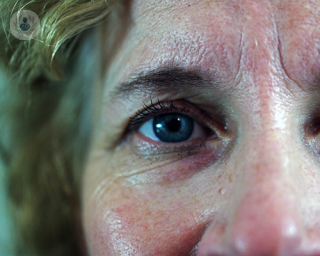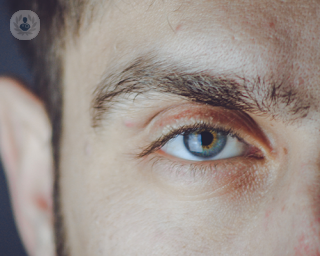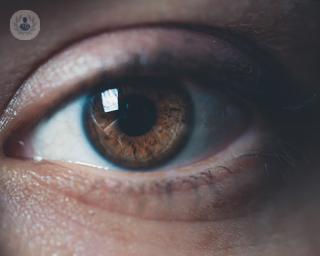Eye floaters
Dr Nick Koutroumanos - Ophthalmology
Created on: 11-13-2012
Updated on: 05-11-2023
Edited by: Conor Dunworth
What are eye floaters?
Eye floaters, medically known as myodesopsia, are floaters that move across your field of vision. They can be many different shapes: lines, shadows, dots, and cobwebs among others. It is one of the main reasons that people visit an ophthalmologist.

Floaters are condensations of the vitreous, which is the gel-like substance in the back of the eye. These condensations casts shadows on the retina as light passes through the eye.
Most floaters are harmless and are a normal part of the ageing process of the vitreous. You should see a specialist if the floaters are appearing more frequently, suddenly, or you are seeing flashes of light.
What are the symptoms?
Floaters appear in the visual field, and can take on many different appearances. They may look like a transparent piece of thread or cobweb, dark specks or blobs, or rings.
They tend to move across your field of vision as you move your eyes around. and they seem to disappear or be difficult to see when you try to look at them directly.
They tend to be seen better when looking at a bright and well-lit surface.
What causes eye floaters?
The exact cause for eye floaters is unknown, but it is known to be related to the ageing process. As we get older, the vitreous changes from a jelly-like substance, becoming more liquid. Tiny fibres in the eye, made of a protein called collagen, can then attach to each other and cast shadows on the retina. These are the floaters that you can see in your field of vision.
Floaters are also more common in people who suffer from myopia, or nearsightedness. This is due to the shape of the eye. Floaters are more likely to develop if the eye is elongated, and very near-sighted people typically have a more elongated eye.
Floaters can also appear after cataract or capsulotomy surgery. During cataract surgery, the eye is manipulated as a new lens is inserted into it. This can cause the vitreous to move from its original position. This can cause floaters to appear.
In certain cases, floaters can be caused by much more serious conditions. One such condition is retinal detachment. As the vitreous shrinks due to aging, it can pull on the retina, causing it to detach.
A similar condition is a retinal tear, when the vitreous pulls on the retina and causes it to tear rather than detach. This can progress into a full retinal detachment.
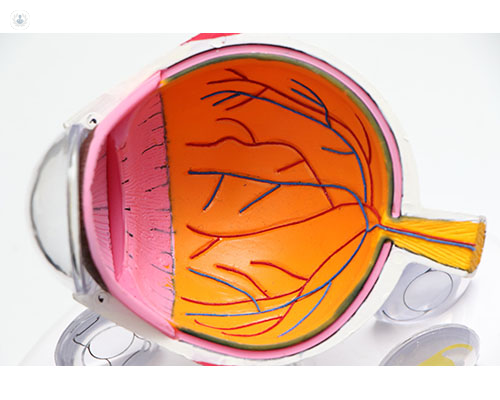
Why do eye floaters sometimes occur at a young age?
Although it is more common to have floaters if you are over the age of 50, they can sometimes occur when you are much younger. Some people first start to notice floaters in their childhood or teenage years.
One of the main factors that could cause floaters in younger people is near-sightedness. Other possible causes include eye trauma, eye surgery, posterior eye inflammation or diabetic retinopathy.
How can they be prevented?
It is recommended to have your vision tested regularly, especially after the age of 40, to be able to check for floaters that may pose a risk to your vision.
A healthy diet can also help protect your eye health. Foods such as salmon, and other fatty fishes provide omega-3 fatty acids that can help prevent vision problems. Leafy green vegetables and citrus fruits can also help promote good eye health.

Will eye floaters go away?
Floaters usually don´t go away on their own, although many people report seeing them less frequently over time. This can happen due to the brain gradually learning to ignore the floaters. As some of the other treatments for floaters can be quite dangerous, many doctors will advise their patients to try and ignore the floaters until the brain adjusts to them.
Are eye floaters dangerous?
In most cases, floaters are not dangerous. As the eye ages, the vitreous naturally changes texture, which often causes floaters. This is why many people first start to notice them in their 50s.
However, if you start to suddenly notice a lot more floaters or flashes of light in your vision, you should see a specialist as soon as possible. If your vision suddenly goes, or a black shadow is passing over your vision, go straight to A&E. These are signs of retinal detachment, and if not treated immediately, you could lose your vision.
What is the treatment?
There currently isn’t a treatment to completely get rid of eye floaters and patients have to get used to them. There are however medications that can delay the onset of floaters as well as two other treatments:
- Vitreolysis: uses a laser which vaporises vitreous opacities that makes them less visible or moves them away from your visual field. However, vitreolysis is not suitable for all patients as the floaters may be located dangerously close to the retina. An exam will have to be carried out by an ophthalmologist to determine if a patient is a suitable candidate.
- Vitrectomy: surgery to remove some or all of the vitreous humour from the eye and replace it with a saline solution. This procedure is performed as a last resort as it is a high-risk operation, and could lead to infection, bleeding in the eye or retinal detachment.
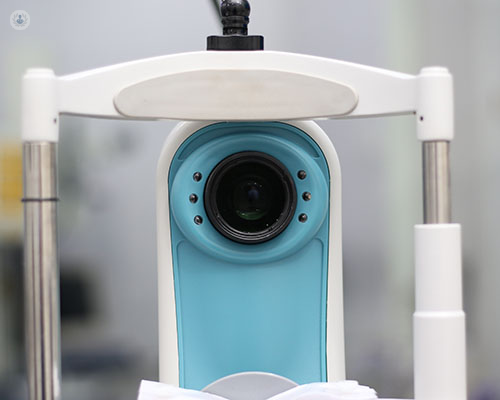
Which specialist treats eye floaters?
Ophthalmologists treat eye floaters, as well as preventing, diagnosing and treating other eye diseases that affect the visual capacity of the patient. It is essential to make sure your eyes are healthy to protect your vision. Ophthalmologists can help treat the eye through surgery or other medical techniques.

